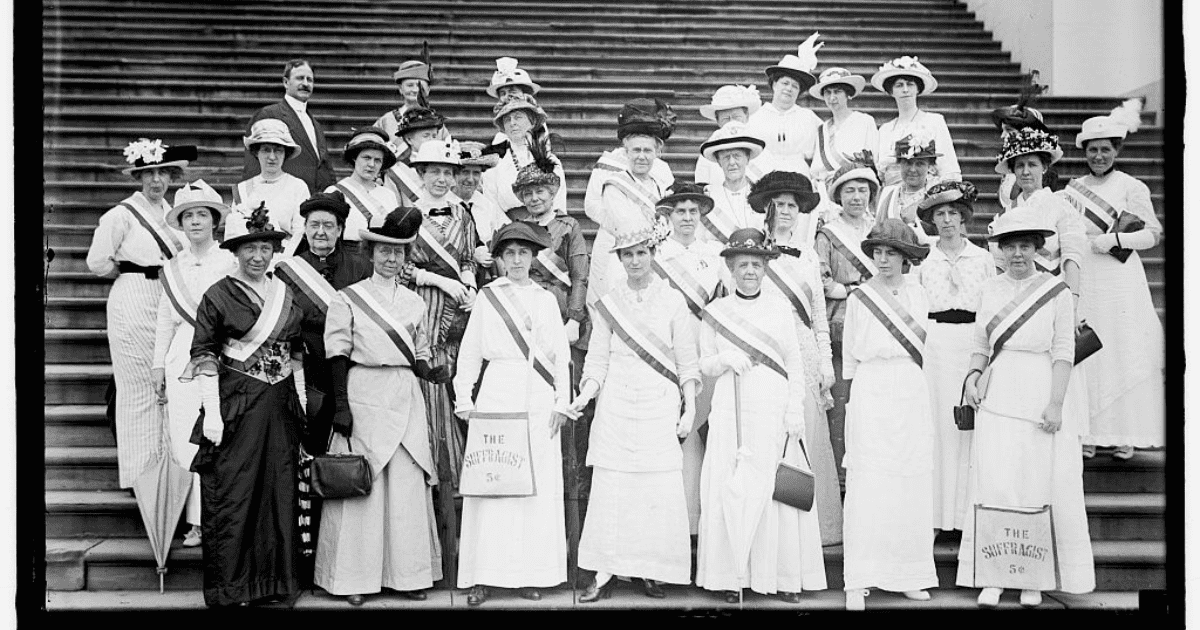By Elise DeYoung
“What began as a movement with the principled intention of equality for women has turned into an abstract ideology that is seeking to overthrow all traditional structures under the guise of women empowerment.”
I wrote this over a year ago for a thesis project, which I titled “Behind the Veil of Feminism.” My goal for the assignment was to look beyond the boss babe propaganda and the gender pay gap debate to answer the deeper question, “What is the ideology of feminism?”
After researching its ideology and those who have historically promoted it, I firmly concluded, and still believe, that feminism is, in fact, “an abstract ideology that is seeking to overthrow all traditional structures under the guise of women empowerment.”
However, I excused first-wave feminism, arguing that feminism fell short of its original, righteous design during the third and fourth waves. It wasn’t until recently when I revisited the first wave, that I became convinced that feminism has never been “a movement with principled intentions.”
Feminism, from its conception, has always been a dangerous ideology, designed to destroy all traditional structures and ways of life.
The Origin of Feminism
The ideology of feminism was born out of the minds of women like Susan B. Anthony, Lucy Stone, and Elizabeth Cady Stanton. These women were discontented with the status of women in 19th century America. They worked to revolutionize the relationship between women and the broader society.
The movement was officially conceived in 1848 at the Seneca Falls Convention with the signing of the Declaration of Sentiments. The first wave ended in 1920 with the ratification of the 19th Amendment.
This period of feminism is largely looked upon with approval by both conservatives and progressives because it resulted in a woman’s right to vote, which in turn led to educational, vocational, and political equality between the sexes. Surely, with these results, we must conclude that first-wave feminism was principled and beneficial. Before we come to this conclusion, we must challenge ourselves with the question, why didn’t feminism dissolve after these political wins? Why have we continued to see a second, third, and fourth wave (each more radical than the last)?
Because the feminist mission was not complete after the ratification of the 19th Amendment. The amendment was only a means to an end to the early feminists. So, what then, is their end? Thankfully, we do not have to ponder this question long because the early feminists clearly laid out their radical intentions in the Declaration of Sentiments. After examining exactly what the first feminists wrote, I believe it will become clear that the end of feminism has always been social revolution through the reproach and replacement of men and the rejection of the family.
Social Revolution
Leftist movements always have a shared value of revolution. Whether it is climate change, critical race theory, or the LGBTQIA+ movement, all progressive movements call for the dismantling of the past to prepare for the restructuring of the future. Feminism is no exception to this rule.
In the Declaration of Sentiments, Elizabeth Stanton makes the case that in order for women to have the rights they deserve and the positions in society that they desire, a political and social revolution is required. Stanton writes that such a revolution “Has been the patient sufferance of the women under this government, and such is now the necessity which constrains them to demand the equal station to which they are entitled.”
Stanton wrote revolution into the fabric of feminism. The ideology itself demands the overthrowing of systems, ideas, and traditions which constrain it. Revolution—the foundation of the philosophy—has manifested itself largely in feminism’s insistence on the reproach and replacement of men in society and the rejection of marriage.
All progressive movements call for the dismantling of the past to prepare for the restructuring of the future.
The Reproach and Replacement of Men
We are never surprised today when we hear feminists complaining about the so-called “patriarchy” and expressing their disdain for men. However, this argument has been made since the founding of the ideology.
Stanton wrote, “The history of mankind is a history of repeated injuries and usurpations on the part of man toward woman, having in direct object the establishment of an absolute tyranny over her.” She continues by saying, “He has endeavored, in every way that he could to destroy her confidence in her own powers, to lessen her self-respect, and to make her willing to lead a dependent and abject life.”
The brash claim that all men have “an absolute tyranny” over all women is not new. From the beginning, feminists have implanted a disdain for men into their followers. They have done this largely by convincing women of a long list of grievances that men have committed against them. Stanton included such a list in her declaration and used it to justify the destructive nature of the ideology of feminism against men. In short, she argued that men have conducted the government, conditioned society, and instituted religion in order to oppress women. You may be more familiar with this concept as it is known today—the patriarchy.
The feminist solution to this alleged problem is for women to stand up and overthrow men’s tyranny over them. Or as we hear it today, “women need to be empowered to rise up and overthrow the patriarchy.” The effects of this thinking have been women replacing men in almost all spheres of life. Husbands and fathers have been replaced by single mothers or unconventional family units, the universities have been dominated by women, the military has manipulated its standards to uphold women over men, and the workplace has been radically reworked to value women workers over men. The list goes on.
Whether you support these social trends is irrelevant. The fact that cannot be denied is we are seeing the replacement of men in society, and this is all by the first feminists’ design.
The Rejection of Marriage
The most destructive war that feminism has waged since its founding is the war against the traditional family. Some may be tempted to believe that the feminist attack on the family began in 1963 when Betty Friedan published her book Feminine Mystique. In it, Friedan argued that the station of a wife and homemaker is equivalent to that of a slave—where the home is a prison, children the chains, and the husband the jailer. Sadly, this flawed thinking dates back much farther than the 20th century.
The most destructive war that feminism has waged since its founding is the war against the traditional family.
The Declaration of Sentiments reads, “In the covenant of marriage, she is compelled to promise obedience to her husband, he becoming, to all intents and purposes, her master—the law giving him power to deprive her of her liberty, and to administer chastisement.” From its beginning, feminism has ruthlessly attacked the institution of marriage by degrading and misrepresenting it.
Not only this, but the early feminists have always fought to loosen divorce laws to favor wives over their husbands. “He has so framed the laws of divorce, as to what shall be the proper causes of divorce; …the law, in all cases, going upon the false supposition of the supremacy of man, and giving all power into his hands.”
A world in which men “lose” and women “win” in a divorce was the world that the early feminists were seeking to create. Thanks to legislation like no-fault divorce, we are living in the first feminists’ imagined utopia where marriage vows are easily broken, and families are routinely torn apart.
The Results of Feminism
Feminism is arguably one of the most powerful leftist movements in history. This is partially because it has had over two centuries to do its damage and also because it has wrongly been accepted as a societal good.
Feminism is arguably one of the most powerful leftist movements in history.
Whether you consider the decline of masculinity, the rise of “boss babe” culture, the acceptance of abortion as a “Constitutional right”, the rejection of marriage, and the rise of divorce—it cannot be denied that we live in a society today that has been gravely affected by the ideology of feminism.
While we cannot attribute all these civil illnesses to feminism alone, we must recognize that this was the future that the first feminists envisioned. Elizabeth Stanton closes her feminist declaration with the words, “We shall employ agents, circulate tracts, petition the State and national Legislatures, and endeavor to enlist the pulpit and the press in our behalf. We hope this Convention will be followed by a series of Conventions, embracing every part of the country.”
Congratulations, Elizabeth, you got your wish.
It should not surprise us when we see modern feminism bent on destruction. The first feminists planted these seeds of destruction and revolution from the beginning. They only needed time to grow.
We need to stop excusing first-wave feminism as a “principled movement” because once we accept that premise, we lose the fight. Feminism has always used corruption and destruction as its means to its end—and that end has always been a revolution of society, the reproach and replacement of men, and the rejection of marriage.
Read other articles by Elise here.

Elise DeYoung is a Public Relations and Communications Associate and a Classical Conversations® graduate. With CC, she strives to know God and make Him known in all aspects of her life. She is a servant of Christ, an avid reader, and a professional nap-taker. As she continues her journey towards the Celestial City, she is determined to gain wisdom and understanding wherever it can be found. Soli Deo gloria!















